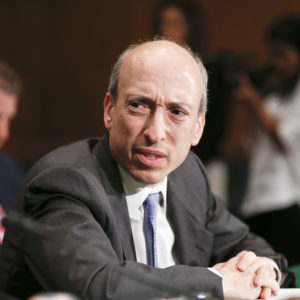“Who among us should get to decide the future of emerging technologies like crypto and blockchain? Should it be SEC Chair Gary Gensler, an unelected bureaucrat who answers only to himself? Or should it be the United States Congress, whose members are elected by and therefore accountable to the people?”
That was the question Rep. Ritchie Torres, D-New York, raised during a recent House Financial Services Committee hearing. And he believes a recent court ruling against the Securities and Exchange Commission confirmed his answer.
On July 13, Judge Analisa Torres (no relation to the congressman) of the Southern District of New York ruled against Gensler and the SEC in its lawsuit against pioneering crypto company Ripple and its crypto token called XRP. Gensler sued Ripple for allegedly committing a securities violation by selling the tokens. Judge Torres rejected Gensler’s premise, ruling that XRP is “not necessarily a security on its face” and that individuals purchasing the tokens are not buying securities. (The judge ruled that sales of the tokens to institutional investors, like hedge funds, could be treated like securities.)
Judge Torres specifically criticized Gensler for misapplying the Howey Test (developed by the Supreme Court in 1946) to determine whether a financial transaction qualifies as an investment. The judge’s ruling against Gensler was a significant blow against Gensler’s approach to regulating crypto.
Crypto enthusiasts hope Ripple’s recent court win means a sunnier future is on the horizon.
“To say I am happy would be an understatement,” Tony Christopher, who has been involved in crypto since 2017, said regarding the judge’s ruling. “We (the XRP community) finally got justice after a two-and-a-half-year wait for clarity. Since the day this lawsuit was filed by the SEC, we all knew it was nothing but a roadblock to slow down the adoption of Ripple (technology) by legacy banking.”
Stu Alderoty, Ripple’s general counsel, told CNBC that is precisely what the company hopes to come next, particularly its On-Demand Liquidity product, which uses XRP for money transfers.
“I think we’re hopeful that this decision would give financial institution customers or potential customers comfort to at least come in and start having the conversation about what problems they are experiencing in their business, real-world problems in terms of moving value across borders without incurring obscene fees,” Alderoty told CNBC.
As the crypto economy expands and new products are developed, Rep. Torres complains that Gensler is trying to create regulations via lawsuits and enforcement actions, which is the job of Congress.
A 2022 executive order from the White House directed federal agencies to examine the digital market for “systemic financial risks” and make policy proposals. Unfortunately, critics say, Gensler is skipping the “proposal” stage and is trying to push through crypto policy through aggressive enforcement.
“Crypto regulation by enforcement had a dreadful day in court,” Rep. Torres tweeted after the court’s ruling. “In light of the SDNY’s landmark decision in the Ripple case, the SEC must reassess its reckless regulatory assault on the crypto industry.”
Rep. Torres also expressed frustration that “the SEC has not issued a single rule on crypto assets.” Instead, he wrote, “The SEC has chosen to communicate and regulate not by clear rule or guidance but by enforcement actions, often politically timed. The endless stream of contradiction and confusion, as well as the arbitrariness of the enforcement actions themselves, is the opposite of fair notice.”
Rep. Torres previously compared the SEC’s crypto actions to “an overzealous traffic agent,” and he wants independent investigations into Gensler’s crypto policy.
Investment companies and analysts Barclays and J.P. Morgan noted Coinbase is in a good spot to benefit from the judge’s ruling. Coinbase was also praised for having a respected reputation and a “market-leading position.”
Other analysts agree. “This is a great outcome for Ripple and cryptocurrency overall since it solidifies a new path forward for investors who are looking for clarity in digital assets,” said Joe Endoso of Linqto, an investment company that calls itself a platform that lets individuals get involved in the private equity market.
“This favorable decision could also continue to drive up Ripple’s price in the secondary market. … We are a strong believer in this company for the long haul.”
XRP has since become one of the top-traded digital currencies behind Bitcoin, Ethereum and Binance Coin.
Gensler has not announced if he plans to appeal the ruling.





